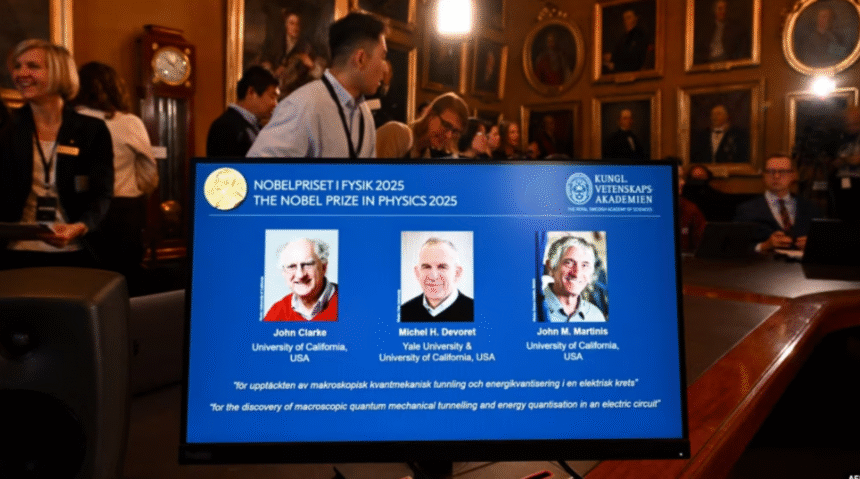Scientists based in the United States — John Clarke, Michel Devoret, and John Martinis — have been awarded the 2025 Nobel Prize in Physics for their “experiments revealing quantum physics in action,” paving the way for the next generation of digital technologies.
“I’m surprised. It never occurred to me that this could lead to a Nobel Prize,” Clarke said during a live phone call at the Nobel press conference on Tuesday.
“I’m speaking through my cellphone, and I believe you are too — and one of the fundamental reasons why a cellphone works is precisely this field of work,” he added.
Quantum mechanics phenomena are well-studied at extremely small scales — atoms and subatomic particles — but are often considered strange and hard to grasp when compared to classical physics and its larger-scale laws.
The Nobel laureates conducted groundbreaking experiments in the mid-1980s using an electronic circuit built from superconductors, proving that quantum mechanics can also influence everyday objects under specific conditions.
“It’s wonderful to celebrate how quantum mechanics, even after a century, continues to surprise us. It’s also incredibly useful, as quantum mechanics forms the foundation of all digital technologies,” said Olle Eriksson, chairman of the Nobel Committee for Physics.
Quantum technology is already present in everyday life — for example, in the transistors that power computer microchips.
“This year’s Nobel Prize in Physics opens the door to the next generation of quantum technologies, including quantum cryptography, quantum computing, and quantum sensors,” stated the Royal Swedish Academy of Sciences, which awards the prize.
Clarke, born in the United Kingdom, is a professor at the University of California, Berkeley.
Devoret, born in France, is a professor at Yale University and also collaborates with the University of California, where Martinis teaches.
John Martinis, an American scientist, led Google’s Quantum Artificial Intelligence Laboratory until 2020. In 2019, his research team at Google achieved “quantum supremacy” — the moment when a quantum computer solved a task much faster than the world’s most powerful supercomputer.
Devoret, in addition to his university work, now serves as Chief Scientist at Google’s Department of Quantum Artificial Intelligence.
The Nobel Prize in Physics, awarded by the Royal Swedish Academy of Sciences, includes a cash reward of $1.2 million USD.
The Nobel Prizes, established through the will of Alfred Nobel, the inventor of dynamite, have been awarded annually since 1901 — honoring achievements in science, literature, and peace. The Economics Prize was added later.
Previous laureates in Physics include some of the most influential figures in science, such as Albert Einstein, Pierre and Marie Curie, Max Planck, and Niels Bohr, one of the pioneers of quantum theory.
This is the second Nobel Prize awarded this week, following the announcement that two American and one Japanese scientists won the Nobel Prize in Medicine for their discoveries related to the immune system. The Chemistry Prize will be announced on Wednesday.
The Nobel Prizes in science, literature, and economics will be presented by the King of Sweden at a ceremony in Stockholm on December 10, the anniversary of Alfred Nobel’s death. The Peace Prize will be announced on Friday and awarded in a separate ceremony in Oslo.







